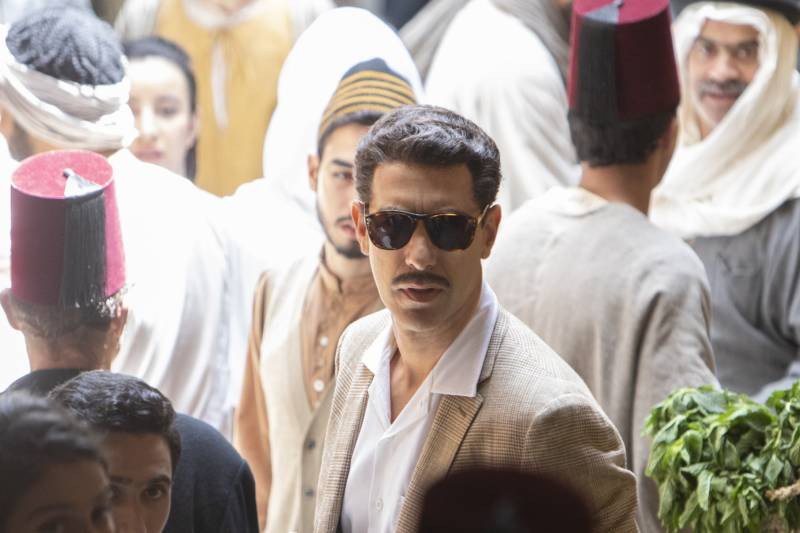In one early scene, the character even appears to briefly forget his real name.
“I’ve always been intrigued by this question of identity—how people identify themselves,” Baron Cohen says. “And for Eli Cohen, he had these two different lives. He was an Israeli second-class citizen living in poverty, and he was also, when he was undercover, a wealthy Syrian.
“So the question of identity, and who you really are, and people who are questioning their own identity or unaware of the irony of their identity—I mean, take for example a character that I first created 20 years ago, Ali G, who’s a white middle-class youth from a suburb in London but who identifies as an African-American gangsta rapper. When he says, ‘Is it ’cause I is black?’ when he’s not, we laugh. But in the case of Eli Cohen, that question of identity, we suspect, and I played him, as that leading to incredible turmoil.”
Sacha Baron Cohen can relate to going undercover. He’s famous for playing Borat, a fictional Kazakh man who was filmed while interviewing unsuspecting real-life Americans, documentary-style. Before that there was Ali G, the dim-witted “hip-hop journalist”; after that, the flamboyantly gay Austrian named Brüno.
“What I try and do when I’m in character is to read the other person,” Baron Cohen says. “If they’re suspicious, they squint their eyes, they look you up and down. Part of what I’m doing is: I’m acting, but I’m also observing the other person to see if they are suspicious or… if they feel calm. And if they’re suspicious, then I back down. I won’t say anything funny for a while, and I’ll try and go deeper into character. And if they’re not suspicious, then I take more risks.”
For the 2018 series Who Is America? he invented multiple characters, which he used to make satirical proposals to unsuspecting Americans. One of his characters was an Israeli soldier—who landed an interview with former Vice President Dick Cheney. That presented a special challenge.
“Dick Cheney may be many things, but he’s not an idiot,” Baron Cohen says. “And so when I first sat down with him, his main intention was to find out whether I was legitimate or not. And so he asked me to chronicle my military history.”
Luckily for Baron Cohen, he had a meeting with a real-life Israeli soldier right before the interview.
“And so I said to this guy, I said, ‘Listen, I want you to tell me about your military history,'” Baron Cohen says. “And this man said to me, he goes: [affecting an accent] ‘OK. At the age of 7, I went to school. I had a lunch box in one hand and a gas mask in the other. And at that point I realized I wanted to be a soldier.’
“And then cut to an hour later. Dick Cheney comes in the room, and he says, ‘Listen, before we start this interview, tell me about your military history.’ And I said: [in character] ‘Vice President Cheney, at the age of 7, I went to school with a gas mask in one hand and the lunchbox in the other. And that’s when I realized I wanted to be a soldier.'”
Though the satirical characters have brought him fame, Baron Cohen says he’s “tried very hard” to not become a celebrity. For many years, he refused to give interviews as himself.
“It was actually a fantastic life,” he says. “I remember being dressed as a character I did called Borat, standing in HMV—which was the biggest record and DVD shop in London—next to the stand selling videos of Ali G. And so I was surrounded by fans of Ali G and me, and I was dressed as Borat, and nobody knew it was me. And for me that was the real pleasure.”
Danny Hajek and Arezou Rezvani produced and edited this interview for broadcast. Patrick Jarenwattananon adapted it for the Web.
Copyright 2019 NPR. To see more, visit NPR.9(MDAxOTAwOTE4MDEyMTkxMDAzNjczZDljZA004))

9(MDAxOTAwOTE4MDEyMTkxMDAzNjczZDljZA004))

